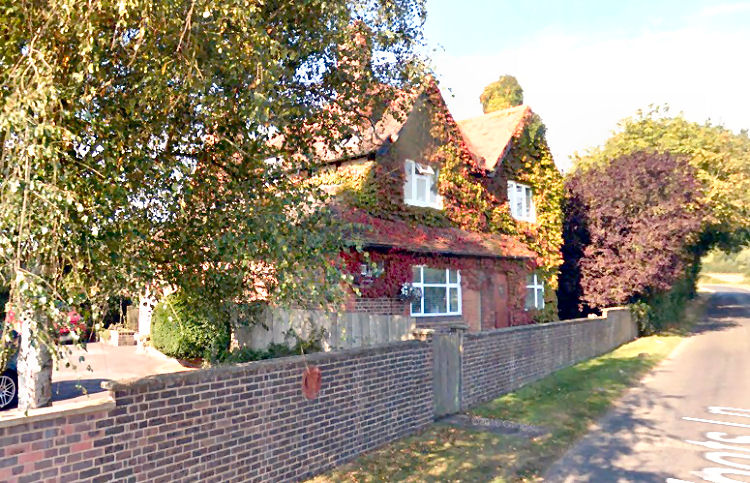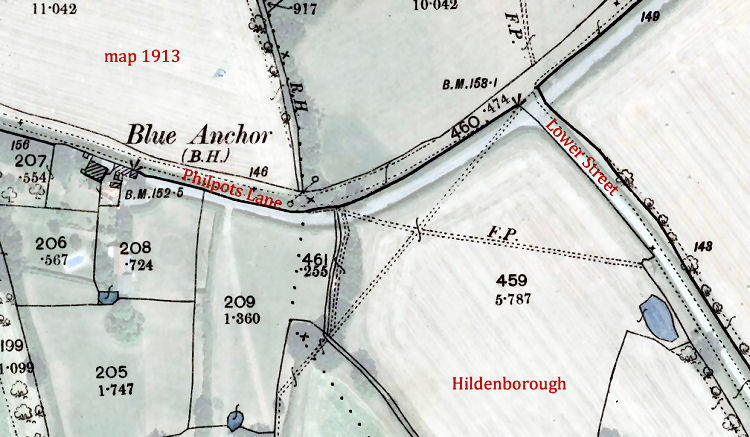|
From the Kent and Sussex Courier, 26 September, 1873.
AN INNKEEPER OUT ON THE SPREE.
William Jenner, inn keeper, of Sevenoaks Weald,
("New Inn, Plaxtol) and Mark Hills, of the
City of Westminster, police constable, were summoned for being drunk,
violent, quarrelsome, and disorderly in the "Blue Anchor" beerhouse,
Leigh, on the 12th inst., and refusing to quit when requested to do so
by the landlord, Richard Gasson.
Mr. Palmer supported the case, and said the charge against Hills had
been withdrawn.
Caroline Gasson, the daughter of the landlord, said that on the night of
the 12th inst., at about eight o’clock, the defendant Jenner and a man
named Hills were in the house, and the defendant called her mother very
bad names. Her father told him to be quiet and go out, when the
defendant threw his arms about and swore he would kill her father in his
own house. He was again requested to leave but he refused to do so, and
was very violent. The other man Hills remained in the house for an hour
and a half.
Mrs. Caroline Gasson, the wife of the landlord, said she saw the
defendant call at the house, and she corroborated her daughter’s
statement. She also added that on Thursday evening she saw the defendant
with P.C. Irwin, when he said it would be her worst day’s work if ever
she went against him, he would ruin her.
P.C. Irwin said he saw the defendant, when he accompanied Mrs. Gasson to
him, and then he said it would be the worst day's work she ever did if
she went against him.
Defendant denied that he was drunk, or said the words imputed to him, or
that he was ordered to leave. When they went in his friend called for a
pint of beer, but when he made his appearance they took it away.
The Bench fined the defendant £2 and 19s costs, and added that the
defendant’s conduct in this case had been most outrageous. He, a man
keeping a public-house himself to go to another public-house, was, they
thought, extremely disgraceful. Not only that, he had threatened the
parties in the case to do them harm, and they considered the case a bad
one.
The case against Hills was withdrawn, it was stated, by the consent of
Major Scoones, Mr. Palmer suggesting 'because he was a policeman.’
|
|
PUBLIC HOUSES OF THE WEALD by Tessa Leeds.
The Weald, like many other villages, once boasted more Public
Houses that it does in the present day. The reason for there being
so many in the first place was due to the Government passing The
Beer Shop Act of 1830. This Act enabled virtually any householder to
produce beer on his/her own premises for sale, providing that an
annual excise fee was paid.
The Blue Anchor almost out of the parish of Sevenoaks Weald on
Coppings Road/Philpots Lane was owned and run by Buller Sceal (my
grandmother Alice's younger brother) in the late 19th or early 20th
century. Now a house. (2021)
Further notes.
Anchor Cottage Hubbards Hill, I have never found any evidence to
support the theory that this even operated as a Beer Shop, the Beer
Shop act came in in 1830 so if it had been there should be something
in writing. I think the name might be due to its position like an
anchor to the hill although it would seem a good spot to take a
break on the way to town. It is two tiny cottages and even as one
could not have entertained many people.
The "Blue Anchor" was virtually in the parish of Leigh, it was no
where near Sevenoaks and anchor cottages on hubbards hill would be
equidistant from either by maybe 2 miles. Buller Sceal my Great
uncle ran the "Blue Anchor" and he died in the 1950's so it predated
that. The only pubs in the village of weald which were able to sell
spirits were the "Chequers"
and the "Windmill"
all the rest were beer shops and I think the "Queens
Head" was in existence for only a few years while the tunnel was
under construction 1863 - 68 it doesn't claim to be more than
cottages in any census.
|

